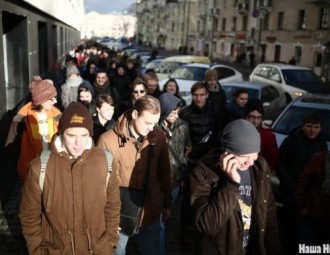In Belarus students are threatened with sanctions for participating in NGOs and protests

Among the “anti-state” NGOs are even organizations with official registration.
The Belarusian State Medical University’s authorities ordered group monitors to warn students against participating in ‘illegal’ and ‘anti-state’ organizations.
On February 17, pro-government activist Viktar Sery, a student of the BSMU, named the organizations ‘Fellowship of the Organizers of the Student Self-government’, ‘Center of Student Initiatives’ ‘unauthorized’ and ‘illegal’ on his Vkontakte page. He also recommended monitors of groups to hold preventive conversations and information sessions and condemn undesirable participation of students in the activities of these organizations, Belsat informs.
Interestingly, all the student organizations mentioned above are registered. Their members have already asked the administration of Belarusian State Medical University to give the reason for such charges.
Uladzimir Manulik, a Vice Rector of the BSMU, has declined to comment on the information given by the university’s activist.
Meanwhile, an anonymous post describing a similar situation appeared in the community ‘This is Minsk, baby!’ on February 17.
Its author states that the university authorities are threatening students with expulsion in case they join some ‘suspicious’ groups or contact strangers during ‘critical’ days, i.e. February 17, February 23, March 5-8, March 25. Moreover, they were advised against leaving their homes and hostels.
On March 25, Freedom Day is unofficially celebrated in Belarus. It commemorates the creation on that date in 1918 of the Belarusian Democratic Republic (BNR). Lukashenka’s regime denies Freedom Day and often prevents the opposition forces from celebrating it.
The information about the order tagged the ‘witch hunt’ has been confirmed by a number of students of the Belarusian State University and the Belarusian State University of Informatics and Radioelectronics.
-
03.01
-
07.10
-
22.09
-
17.08
-
12.08
-
30.09



























